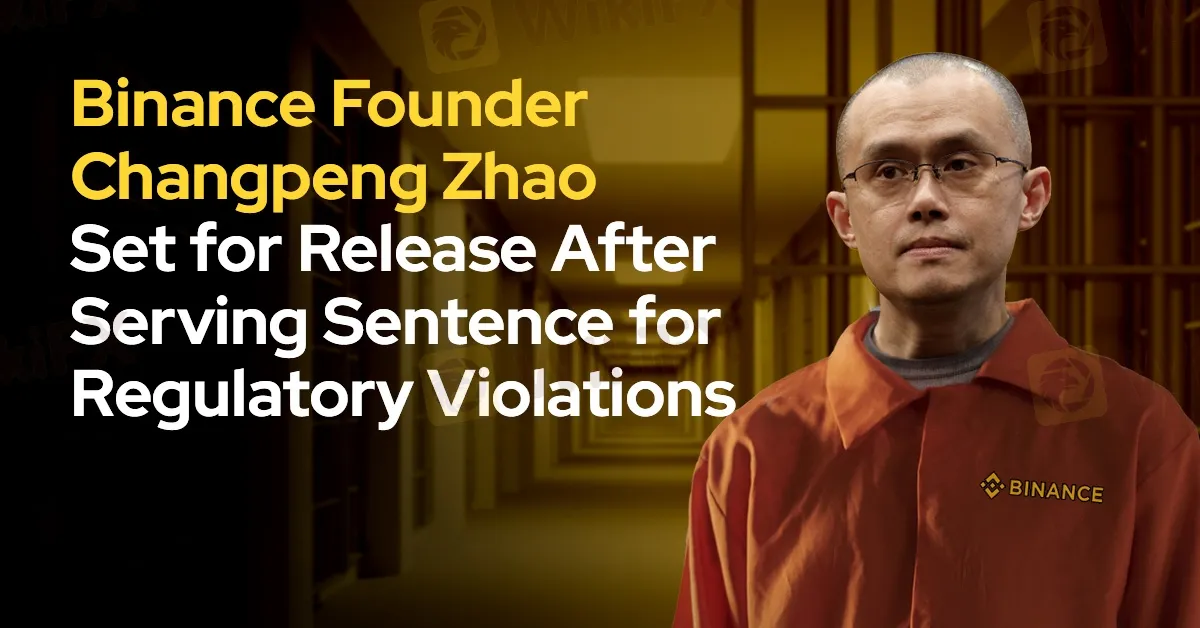简体中文
繁體中文
English
Pусский
日本語
ภาษาไทย
Tiếng Việt
Bahasa Indonesia
Español
हिन्दी
Filippiiniläinen
Français
Deutsch
Português
Türkçe
한국어
العربية
Binance Founder Changpeng Zhao Set for Release After Serving Sentence for Regulatory Violations
Abstract:Changpeng Zhao, the founder of cryptocurrency exchange Binance, is set to be released from custody on September 29, as indicated by the U.S. Bureau of Prisons website.

Changpeng Zhao, the founder of cryptocurrency exchange Binance, is set to be released from custody on September 29, as indicated by the U.S. Bureau of Prisons website. Zhao, identified as inmate 88087-510, has been serving a four-month sentence at Lompoc II, a low-security prison in California. His sentence will conclude with a short period at a halfway house in San Pedro, California.
Zhao's imprisonment began after he pled guilty to violating the Bank Secrecy Act due to Binances failure to implement proper Know Your Customer (KYC) procedures. As part of the plea deal, he agreed to pay a substantial fine of $50 million and to step down from his position as CEO of the exchange. His sentence at Lompoc II, which holds around 2,160 inmates, contrasts sharply with the harsher conditions of the New York prison where Sam Bankman-Fried, former CEO of FTX, is serving a 25-year sentence for unrelated charges.

Following Zhao‘s resignation in April, Richard Teng, a former regulator from Abu Dhabi and Singapore, took over as CEO of Binance. The company itself faced criminal charges for violating U.S. sanctions and money-transmitting laws, for which it agreed to pay $4.3 million in settlements. Zhao’s sentencing followed the culmination of multiple investigations into Binances regulatory compliance and its operational practices in the U.S.
The legal case against Zhao drew significant attention given his prominence in the cryptocurrency world. Prosecutors originally sought a three-year sentence, but a federal judge reduced the term to four months, which was longer than those imposed on some other crypto executives for similar offenses. Despite the relatively brief sentence, Zhao's time in custody made him one of the highest-profile figures to face incarceration for violations related to cryptocurrency regulation.
Throughout his incarceration, Zhao remained a subject of speculation, especially with rumours surfacing online about his whereabouts after his transfer from Lompoc II in late August. However, the Bureau of Prisons continued to list September 29 as his official release date. Before entering prison, Zhao hinted at plans to use his time behind bars to work on a writing project, though details about this endeavour remain unclear.
Zhaos net worth, estimated at $36.5 billion by Bloomberg, places him among the wealthiest individuals to have ever been incarcerated in the U.S. His case highlights ongoing challenges in regulating the rapidly evolving cryptocurrency industry, and his release is expected to draw further attention to the future of Binance under new leadership.

Disclaimer:
The views in this article only represent the author's personal views, and do not constitute investment advice on this platform. This platform does not guarantee the accuracy, completeness and timeliness of the information in the article, and will not be liable for any loss caused by the use of or reliance on the information in the article.
Read more

Why More People Are Trading Online Today?
Discover why online trading is booming with tech, AI, and a push for financial freedom. From stocks to crypto, it’s a thrilling hustle for all.

SEC Ends Crypto.com Probe, No Action Taken by Regulator
The SEC has closed its investigation into Crypto.com with no action taken. Crypto.com celebrates regulatory clarity and renewed momentum for the crypto industry.

Interactive Brokers Expands Crypto Trading with Solana, XRP, Cardano, and Dogecoin
Interactive Brokers adds Solana, XRP, Cardano, and Dogecoin to its platform, enabling U.S. and U.K. clients to trade crypto 24/7 with low fees.

South Korean Regulator Blocks Access to 17 Unreported Offshore VASP Apps on Google Play
South Korea’s Financial Intelligence Unit (FIU) has blocked access to 17 unreported offshore VASP apps on Google Play to protect domestic users from potential financial risks.
WikiFX Broker
Latest News
Why Are Financial Firms Adopting Stablecoins to Enhance Services and Stability?
Experienced Forex Traders Usually Do This Before Making a Lot of Money
Octa vs XM:Face-Off: A Detailed Comparison
When High Returns Go Wrong: How a Finance Manager Lost RM364,000
Bridging Trust, Exploring Best—WikiEXPO Hong Kong 2025 Wraps Up Spectacularly
Fidelity Investments Explores Stablecoin Innovation in Digital Assets Sector
Interactive Brokers Expands Crypto Trading with Solana, XRP, Cardano, and Dogecoin
SEC Ends Crypto.com Probe, No Action Taken by Regulator
Why More People Are Trading Online Today?
Broker Comparison: FXTM vs XM
Currency Calculator







